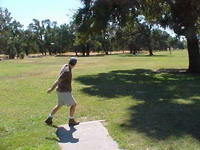University of California officials win legal right to build planned sports center
University of California has won the legal right to get rid of a band of tree-sitters who have taken up residence in a oak grove standing in the way of a planned sports center.

But how do you uproot a tree-sitter in Berkeley, one of America's most politically correct cities?
"Extremely difficult," acknowledges campus spokesman Dan Mogulof.
As the protest nears its one-year anniversary, plenty of people have suggestions: Fire hoses, skunk spray and tranquilizer darts are among the thorny ideas Internet posters have planted.
So far, the university has moved cautiously.
The university wants to remove dozens of the picturesque trees, called evergreen coast live oaks, to build a $125 million (84.3 million EUR) training facility for its athletic teams.
There have been scuffles between police and tree-sitters; and campus officials have put up chain-link fences around the grove. University lawyers have told a judge they are considering pruning lower branches - to make it harder to ferry supplies up to the protesters.
Both sides say they do not want a treetop confrontation.
"It's not an easy thing to do, to climb up into a tree, first of all," said Doug Buckwald, member of a group that supports tree-sitters but doesn't join them. "If you're climbing up into a tree to try to wrestle with somebody and drag them down, you are taking on a high level of risk."
A judge ruled last month that school officials would be within their rights to oust the protesters. Mogulof declined to comment on what tactics campus police might use but said they are "not currently contemplating a forcible removal."
"Any decisions we make are going to be guided by an overriding desire to minimize the chance of harm coming to our officers or the people in the trees," Mogulof said.
The protest began last Dec. 2. It is unclear exactly how many tree-sitters there are, or whether they are students or outsiders. Many rotate in and out at night and wear masks, and they usually give false names.
Although some just spend a few hours in a tree to show solidarity, others seem to hang out for days or weeks, helped by supporters who hoist food, water and reading materials to them in buckets and haul out trash, excrement and other waste.
Notable milestones have included an appearance by conservationist Sylvia McLaughlin, 91, who briefly sat on a tree platform in January. There have been two nude photo shoots, and two sitters have fallen, breaking bones.
The next big development in the case could be a ruling, expected soon, on lawsuits filed by the City of Berkeley and others challenging the building plans. They argue the athletic center would be environmentally and seismically unsound, which campus officials deny.
The judge hearing those lawsuits previously issued an injunction banning construction while the case is pending.
Campus officials say a new gym will allow the school to move athletes out of cramped and dilapidated quarters in the university's 84-year-old Memorial Stadium. They promise to plant three new trees for every one felled.
Berkeley has changed since its '60s heyday as an epicenter of student protest, and the tree-sit does not appear to have generated huge interest on campus. "Unfortunately, a lot of the people are detached," said Jerlina Love, a graduate student who supports the sitters.
But sitters have vowed not to descend as long as the oaks are in peril. The sound of laughter and guitar music wafted from the trees as sitters enjoyed mild temperatures on a golden afternoon this week.
The group was feeling "awesome," said a sitter who would give only her nickname of "Dumpster Muffin." Still, she said, they are concerned for their safety. "It's definitely coming to a head of some sort."
Subscribe to Pravda.Ru Telegram channel, Facebook, RSS!





